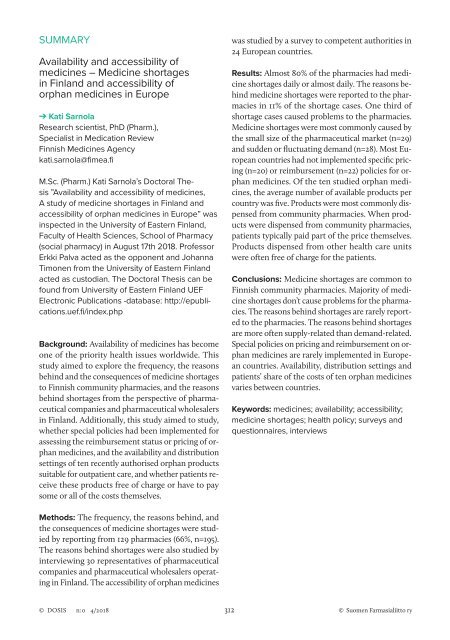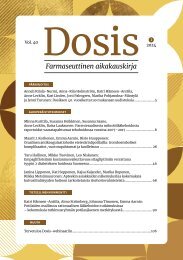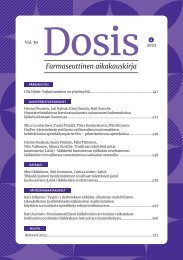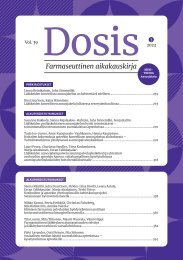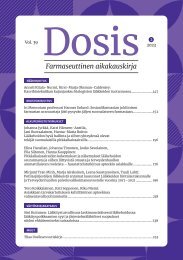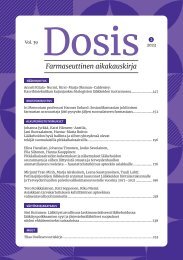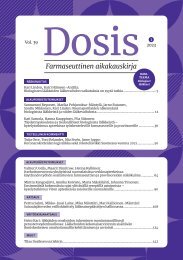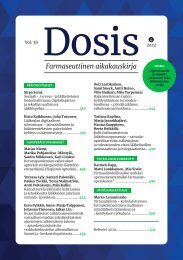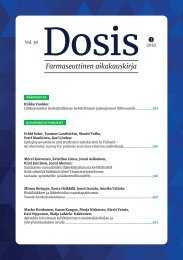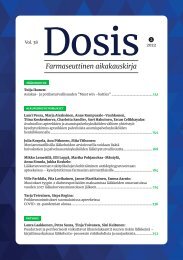Dosis 4/2018
Farmaseuttinen aikakauskirja DOSIS 4/2018 vol.34 Suomen Farmasialiitto ry
Farmaseuttinen aikakauskirja DOSIS 4/2018 vol.34 Suomen Farmasialiitto ry
Create successful ePaper yourself
Turn your PDF publications into a flip-book with our unique Google optimized e-Paper software.
SUMMARY<br />
Availability and accessibility of<br />
medicines – Medicine shortages<br />
in Finland and accessibility of<br />
orphan medicines in Europe<br />
➔ Kati Sarnola<br />
Research scientist, PhD (Pharm.),<br />
Specialist in Medication Review<br />
Finnish Medicines Agency<br />
kati.sarnola@fimea.fi<br />
M.Sc. (Pharm.) Kati Sarnola’s Doctoral Thesis<br />
”Availability and accessibility of medicines,<br />
A study of medicine shortages in Finland and<br />
accessibility of orphan medicines in Europe” was<br />
inspected in the University of Eastern Finland,<br />
Faculty of Health Sciences, School of Pharmacy<br />
(social pharmacy) in August 17th <strong>2018</strong>. Professor<br />
Erkki Palva acted as the opponent and Johanna<br />
Timonen from the University of Eastern Finland<br />
acted as custodian. The Doctoral Thesis can be<br />
found from University of Eastern Finland UEF<br />
Electronic Publications -database: http://epublications.uef.fi/index.php<br />
Background: Availability of medicines has become<br />
one of the priority health issues worldwide. This<br />
study aimed to explore the frequency, the reasons<br />
behind and the consequences of medicine shortages<br />
to Finnish community pharmacies, and the reasons<br />
behind shortages from the perspective of pharmaceutical<br />
companies and pharmaceutical wholesalers<br />
in Finland. Additionally, this study aimed to study,<br />
whether special policies had been implemented for<br />
assessing the reimbursement status or pricing of orphan<br />
medicines, and the availability and distribution<br />
settings of ten recently authorised orphan products<br />
suitable for outpatient care, and whether patients receive<br />
these products free of charge or have to pay<br />
some or all of the costs themselves.<br />
was studied by a survey to competent authorities in<br />
24 European countries.<br />
Results: Almost 80% of the pharmacies had medicine<br />
shortages daily or almost daily. The reasons behind<br />
medicine shortages were reported to the pharmacies<br />
in 11% of the shortage cases. One third of<br />
shortage cases caused problems to the pharmacies.<br />
Medicine shortages were most commonly caused by<br />
the small size of the pharmaceutical market (n=29)<br />
and sudden or fluctuating demand (n=28). Most European<br />
countries had not implemented specific pricing<br />
(n=20) or reimbursement (n=22) policies for orphan<br />
medicines. Of the ten studied orphan medicines,<br />
the average number of available products per<br />
country was five. Products were most commonly dispensed<br />
from community pharmacies. When products<br />
were dispensed from community pharmacies,<br />
patients typically paid part of the price themselves.<br />
Products dispensed from other health care units<br />
were often free of charge for the patients.<br />
Conclusions: Medicine shortages are common to<br />
Finnish community pharmacies. Majority of medicine<br />
shortages don’t cause problems for the pharmacies.<br />
The reasons behind shortages are rarely reported<br />
to the pharmacies. The reasons behind shortages<br />
are more often supply-related than demand-related.<br />
Special policies on pricing and reimbursement on orphan<br />
medicines are rarely implemented in European<br />
countries. Availability, distribution settings and<br />
patients’ share of the costs of ten orphan medicines<br />
varies between countries.<br />
Keywords: medicines; availability; accessibility;<br />
medicine shortages; health policy; surveys and<br />
questionnaires, interviews<br />
Methods: The frequency, the reasons behind, and<br />
the consequences of medicine shortages were studied<br />
by reporting from 129 pharmacies (66%, n=195).<br />
The reasons behind shortages were also studied by<br />
interviewing 30 representatives of pharmaceutical<br />
companies and pharmaceutical wholesalers operating<br />
in Finland. The accessibility of orphan medicines<br />
© DOSIS n:0 4/<strong>2018</strong> 312<br />
© Suomen Farmasialiitto ry


